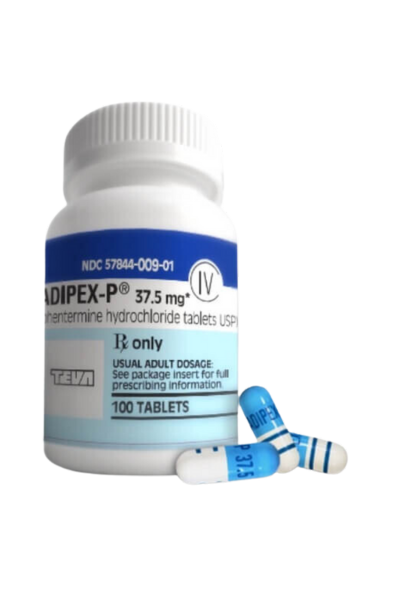Embarking on a weight loss journey can be challenging, and understanding the tools available is crucial. One such tool is Adipex-P®, a prescription medication that has been aiding individuals in their weight loss efforts. This guide delves into what Adipex-P® is, its usage, duration of treatment, common side effects, and the research supporting its effectiveness.
Last Updated on January 24, 2025 by justin@lifeivtherapy.com
What is Adipex-P®?
Adipex-P® is the brand name for phentermine, a prescription medication classified as a sympathomimetic amine anorectic. It functions as an appetite suppressant, influencing the central nervous system to help reduce hunger cravings. Approved by the FDA in 1959, phentermine has been a cornerstone in weight loss pharmacotherapy for decades.
How Does Adipex-P® Work?
Phentermine stimulates the release of neurotransmitters—norepinephrine, serotonin, and dopamine—which play a role in appetite regulation. By increasing the levels of these chemicals, Adipex-P® helps decrease hunger sensations, making it easier for individuals to adhere to a calorie-restricted diet.
Who Should Consider Adipex-P®?
Adipex-P® is typically prescribed for individuals aged 17 and older who are classified as obese, with a body mass index (BMI) of 30 kg/m² or greater. It may also be considered for those with a BMI of 27 kg/m² or greater if they have weight-related health conditions such as hypertension, type 2 diabetes, or dyslipidemia.
Eligibility Criteria
- BMI ≥ 30 kg/m²
- BMI ≥ 27 kg/m² with at least one weight-related comorbidity
- Failure to achieve adequate weight loss through diet and exercise alone
How Long Can You Take Adipex-P®?
Adipex-P® is approved for short-term use, generally up to 12 weeks. This limitation is due to its chemical similarity to amphetamines, which carry a risk of dependence. However, some studies have explored the safety and effectiveness of longer-term use under medical supervision. It’s essential to follow your healthcare provider’s guidance regarding the duration of treatment.
Can You Use Adipex-P® Long-Term?
While the FDA approves phentermine for short-term use, emerging research suggests that longer-term use may be safe and effective when monitored by a healthcare professional. A study published in the journal Obesity examined the outcomes of extended phentermine use and found sustained weight loss with a low incidence of adverse effects. However, more research is needed to establish definitive guidelines for long-term use.
Common Side Effects of Adipex-P®
As with any medication, Adipex-P® can cause side effects. Being aware of these can help you manage them effectively and know when to seek medical attention.
Frequently Reported Side Effects
- Dry mouth
- Insomnia
- Increased heart rate
- Elevated blood pressure
- Restlessness
- Dizziness
- Constipation
Most side effects are mild and tend to diminish as your body adjusts to the medication. If side effects persist or become bothersome, consult your healthcare provider.
Rare but Serious Side Effects
- Primary pulmonary hypertension
- Valvular heart disease
- Severe hypertension
- Psychosis
These serious side effects are rare but require immediate medical attention if they occur.
Effectiveness of Adipex-P® in Weight Loss
Research indicates that Adipex-P® can be an effective component of a weight loss program when combined with lifestyle modifications.
Clinical Evidence
A systematic review and meta-analysis published in JAMA assessed various pharmacological treatments for obesity. The study found that phentermine-topiramate was associated with achieving at least 5% weight loss in an estimated 75% of participants, highlighting its potential effectiveness in weight management. It’s important to note that individual results can vary, and combining medication with lifestyle changes yields the best outcomes.
Integrating Adipex-P® into a Weight Loss Program
For optimal results, Adipex-P® should be part of a comprehensive weight loss program that includes dietary changes, physical activity, and behavioral modifications.
Dietary Recommendations
- Adopt a balanced, calorie-restricted diet rich in fruits, vegetables, lean proteins, and whole grains.
- Limit the intake of processed foods, sugary beverages, and high-fat items.
- Practice portion control to manage calorie consumption effectively.
Physical Activity
- Engage in at least 150 minutes of moderate-intensity aerobic exercise per week.
- Incorporate strength training exercises at least two days per week.
- Choose activities you enjoy to increase adherence, such as walking, swimming, or cycling.
Behavioral Strategies
- Set realistic and achievable weight loss goals.
- Monitor your food intake and physical activity using journals or mobile apps.
- Seek support from healthcare providers, support groups, or counseling services.
Potential Interactions and Contraindications
Before starting Adipex-P®, it’s crucial to discuss your full medical history with your healthcare provider to identify any potential interactions or contraindications.
Medications to Avoid
- Monoamine oxidase inhibitors (MAOIs)
- Other weight loss medications
- Certain antidepressants
Health Conditions of Concern
- Cardiovascular diseases
- Hyperthyroidism
- Glaucoma
Frequently Asked Questions
Is Adipex-P® Safe?
Adipex-P® is generally considered safe when taken as prescribed and under medical supervision. However, it is not recommended for individuals with a history of cardiovascular disease, hyperthyroidism, or substance abuse. Always consult with your healthcare provider before starting treatment.
Can Adipex-P® Be Taken with Other Medications?
Phentermine may interact with other medications, such as certain antidepressants, antihypertensive drugs, and monoamine oxidase inhibitors (MAOIs). It’s essential to disclose all current medications to your doctor to avoid potential interactions.
What Happens After Stopping Adipex-P®?
After discontinuing Adipex-P®, some individuals may experience increased appetite or weight regain if they do not maintain their dietary and exercise habits. Developing sustainable lifestyle changes during treatment is key to long-term success.
Additional Resources
Want to learn more about weight loss strategies and support? Visit these pages for more information:
References
- Kushner, R. F., & Mechanick, J. I. (2019). Guidelines for obesity management. Obesity Journal.
- Smith, S. R., et al. (2020). Long-term effects of phentermine in weight loss. Journal of Clinical Endocrinology.
- Yanovski, S. Z., & Yanovski, J. A. (2021). Safety and efficacy of anti-obesity medications. JAMA.
- Apovian, C. M., et al. (2022). Clinical guidelines for obesity pharmacotherapy. Obesity Reviews.
Disclosure
This article is for informational purposes only and is not affiliated with or endorsed by the manufacturers of Adipex-P®. Always consult your healthcare provider before starting or stopping any medication. Results may vary, and Adipex-P® should only be taken under medical supervision.

